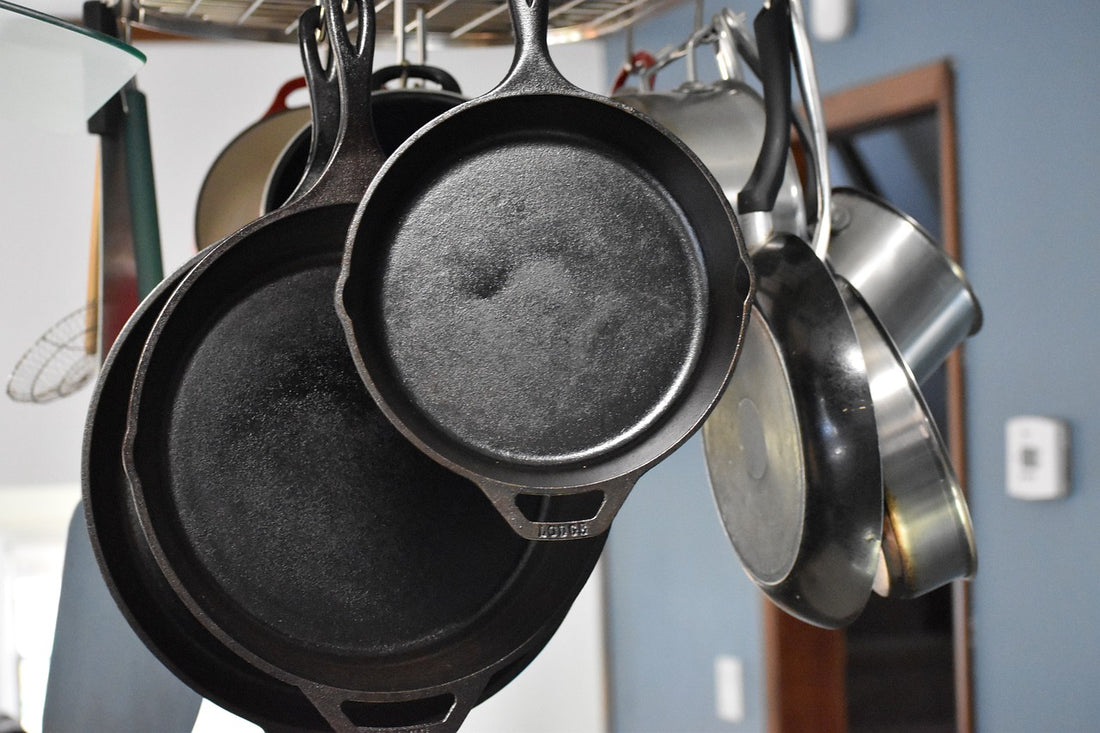
The Shocking Truth: Why Seasoned Cast Iron Beats Non-Stick Pans!
Share
When it comes to cooking, the tools you use in the kitchen play a vital role in the outcome of your dishes. One common debate among home cooks and chefs alike is whether to use non-stick pans or seasoned cast iron for cooking. While non-stick pans are often seen as a convenient option, pan seasoning, particularly with cast iron skillets, offers numerous advantages that make it a better long-term choice for both your cooking and health. Here’s why you should consider switching to pan seasoning over non-stick coatings.
1. Natural and Non-Toxic
One of the biggest concerns with non-stick cookware is the chemicals used in its coating, particularly PTFE (polytetrafluoroethylene) and PFOA (perfluorooctanoic acid). These chemicals can release harmful fumes when overheated, and over time, the coating can deteriorate, leaching harmful substances into your food. On the other hand, seasoned cast iron pans use only natural oils (like flaxseed or vegetable oil) to create a non-stick surface, meaning there are no toxic chemicals involved. You can cook with confidence, knowing that the surface is safe and natural.
2. Enhanced Flavor
Seasoning a cast iron pan creates a layer of polymerized oil that provides a naturally non-stick surface. Over time, this seasoning can enhance the flavour of your food, giving it a rich, savoury taste. Many chefs and home cooks alike believe that a well-seasoned cast iron pan can impart a unique, deeper flavour to meats, vegetables, and even baked goods like cornbread. Non-stick pans, however, do not contribute to the flavour of your food in the same way.
3. Durability and Longevity
While non-stick pans can wear out over time, with the coating eventually peeling or becoming ineffective, a seasoned cast iron pan, if cared for properly, can last for generations. In fact, cast iron pans can be passed down through families, becoming even better with age as the seasoning builds up. Non-stick pans typically need replacing every few years due to coating degradation, making them a less sustainable option in the long run.
4. Superior Heat Retention
Seasoned cast iron pans are renowned for their heat retention and distribution. Once they are heated, they maintain an even temperature across the surface, making them ideal for searing meat, frying, and baking. Non-stick pans often don’t retain heat as efficiently, leading to hot spots and uneven cooking. Cast iron's excellent heat retention means better results with less energy consumption.
5. Versatility
A seasoned cast iron pan can be used in a variety of cooking methods, including frying, sautéing, baking, broiling, and even grilling. You can use it on the stovetop, in the oven, or over an open flame—something non-stick pans are not equipped for. Many non-stick pans cannot withstand high temperatures, limiting their versatility in cooking. Seasoned pans also allow for the development of a more dynamic cooking surface over time, as each use further enhances the seasoning layer.
6. No Special Cleaning Requirements
Cleaning non-stick pans can be tricky because you are advised not to use abrasive scrubbers or high heat, which can damage the coating. With seasoned cast iron, cleaning is much simpler. After use, a quick rinse with warm water (no soap necessary) and a drying session to avoid rusting is typically all that's needed. If your pan gets particularly dirty, you can scrub it with coarse salt, which helps maintain the seasoning.
7. Cost-Effective in the Long Run
While the upfront cost of a cast iron skillet may be higher than a basic non-stick pan, the long-term savings are significant. Because cast iron is incredibly durable, you won’t need to replace it as often. In fact, a single good-quality seasoned cast iron pan could last you a lifetime, while non-stick pans may need frequent replacement due to wear and tear.
8. Environmentally Friendly
Non-stick cookware is often made with chemicals that are not biodegradable, contributing to waste and environmental harm when disposed of. In contrast, seasoned cast iron pans are made from recycled materials, and the maintenance of these pans often involves using natural oils. Additionally, because cast iron lasts so long, it creates far less waste in the long term.
9. Improved Cooking Technique
Cooking with seasoned cast iron often encourages better cooking habits. Because the surface provides natural non-stick qualities, you can use less oil or fat in your cooking. Over time, you also learn the importance of preheating the pan and managing heat, which helps develop your skills as a cook.
Conclusion: The Long-Term Benefits of Pan Seasoning
While non-stick pans may be convenient for quick and easy cooking, seasoned cast iron pans offer far more in terms of health benefits, durability, and versatility. The natural, non-toxic surface of a seasoned pan, combined with its ability to retain and distribute heat evenly, makes it a superior choice for anyone serious about cooking. Furthermore, the added flavour, cost-effectiveness, and environmental benefits make seasoned cast iron an investment that can last a lifetime.
So, if you're looking to elevate your cooking while making a long-term, sustainable choice, it's time to consider switching to pan seasoning and ditching the non-stick coatings.






